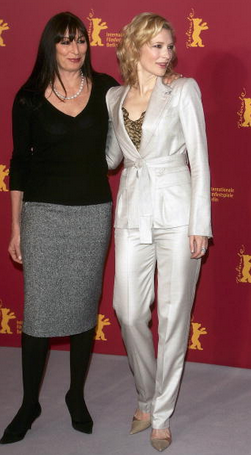When it comes to live action portrayals of Lady Tremaine, Cinderella’s wicked stepmother, the only two women worth taking note of are Anjelica Huston in Ever After: A Cinderella Story and Cate Blanchett in Cinderella. While Lady Tremaine may have been altered to Baroness Rodmilla de Ghent in Ever After, she proves a worthy contender for bitchery against Cate Blanchett’s interpretation of the quintessential stepmother wench. The question is, who wins out with her icy demeanor in the end? Let’s take a look at their cuntiest dialogue to find out.

With Danielle de Barbarac (Drew Barrymore) as Cinderella in Ever After, we are presented with a fiercely independent, incredibly stubborn version of the legend. Her stepmother, the baroness, is equally as rigid and uncompromising, which means the two butt heads on a second to second basis. Even during moments of what could be tenderness, the baroness falls short of her motherly duties, as with the exchange that occurs while Danielle combs her hair and asks, “Do you really think I look like [my father]?”, to which the baroness replies, “Well, your features are rather…masculine.”

Elsewhere, the baroness kicks Danielle while she’s down in the wake of being rejected by the prince. Mocking Danielle’s dedication to her work in order to take her mind off her heartbreak, the baroness notes, “Men are so fickle, aren’t they? One minute, they’re spouting sonnets, the next you’re back to being the hired help.” Pushed beyond the threshold of her patience, Danielle demands her stepmother to leave, that she’s won the war and needn’t bother her anymore. It is during this argument that she finds the courage to inquire, “Was there a time even its smallest measurement that you loved me at all?” The baroness coolly responds, “How can anyone love a pebble in their shoe?”

Lady Tremaine (Blanchett) brings an equal amount of torture to her own Cinderella (Lily James). After her father dies, leaving Ella alone with her dreadful stepmother and stepsisters, Drisella (Sophie McShera) and Anastasia (Holliday Grainger), she is forced into what amounts to indentured servitude. This includes preparing her stepfamily’s meals. Making the unfortunate mistake of setting a place for herself at the table, Lady Tremaine chides, “Wouldn’t you prefer to eat when all the work is done, Ella?” Ella meekly assents, “Yes, stepmother.” Lady Tremaine corrects, “You needn’t call me that. Madam will do.”

Ella’s daydreaming tendencies don’t sit well with Lady Tremaine either, who admonishes, “What on earth have you been doing?”, prompting Ella to assert, “Dreaming, that’s all.” Lady Tremaine then scolds, “Well then, wake up!” Indeed, there is no room for fantasy in the Tremaine-run household. At her cruelest, she rips Ella’s dress, formerly her mother’s, to shreds in order to prevent her from going to the ball. Before this ghastly move, however, Ella implores her stepmother to let her go to the palace, proudly declaring of her frock, “It was my mother’s dress.” Lady Tremaine flatly denies her, saying, “It would be an insult to take you to the palace dressed in these old rags.”

With such vitriol bandied by Huston and Blanchett in their roles, it’s nearly impossible to decide who would be a worse stepmother to deal with. But, if one had to decide, Baroness Rodmilla de Ghent would be the most likely choice. Her insults are tinged with a far wittier, more undercutting vibe.



















